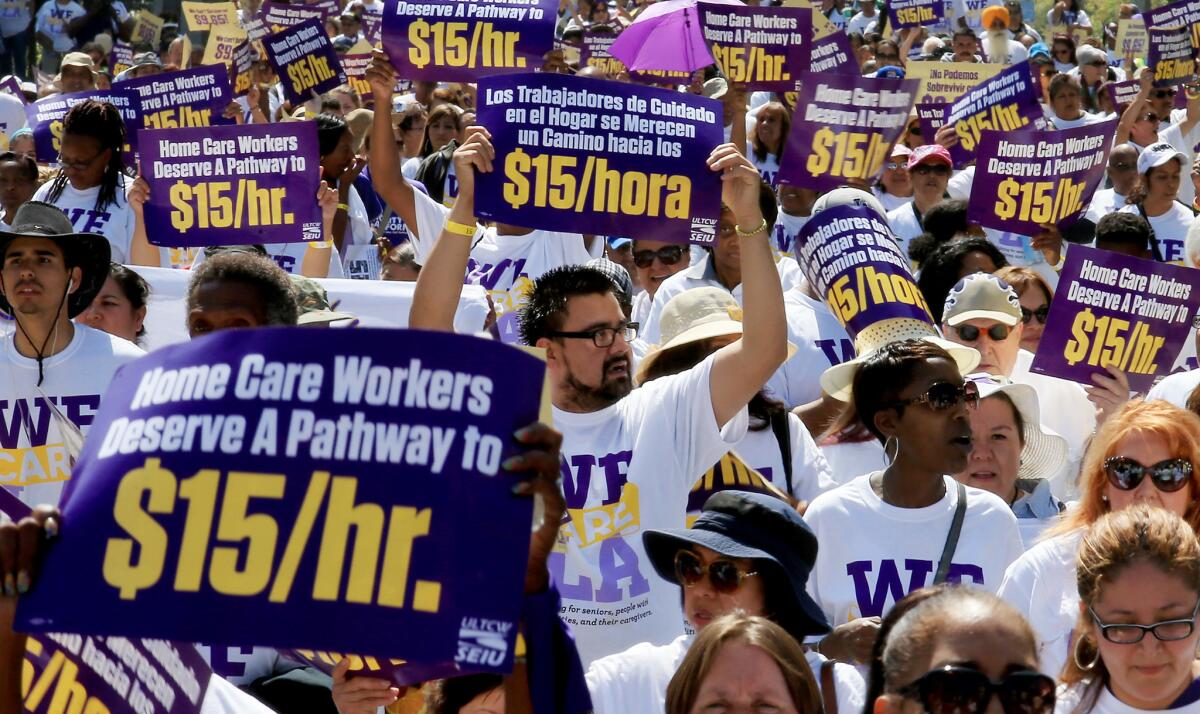L.A. County sets up wage enforcement program to police new minimum wage rules

L.A. County homecare workers march downtown to call for a hike in the minimum wage to $15 per hour on April 14, 2015. Los Angeles County supervisors voted to create a new wage enforcement program to police violations of the county’s minimum wage law.
- Share via
In the wake of this summer’s decision to hike the minimum wage in unincorporated areas to $15 by 2020, Los Angeles County supervisors voted Tuesday to set up a new division to go after employers who violate the wage law.
Details of how the enforcement program will work and what penalties will apply to offending employers remain to be worked out. As part of the program, the county could revamp its business permitting system to require more businesses in unincorporated areas to get county licenses.
The move to create a wage enforcement program was hailed by labor groups that had pushed for such a program, saying that without it, many workers will not actually benefit from the higher minimum wage.
“It sends a strong message to employers, especially those that don’t play by the rules,” said Supervisor Hilda Solis, who led the push for an enforcement division along with Supervisor Mark Ridley-Thomas. “Now there will be a spotlight.”
Some of her colleagues questioned why the county should create its own program when there are already state and federal agencies tasked with enforcing labor laws.
“I agree that wage theft is irresponsible and should be punished to the full extent of the law. We already have a state law,” said Supervisor Michael D. Antonovich, who cast the sole dissenting vote.
Antonovich and Supervisor Don Knabe -- who ultimately voted in favor of the enforcement program -- argued that the state should be responsible for enforcement and that the approximately $1.5 million the county expects to spend on it over the next year could pay for other programs.
County attorney Judy Whitehurst acknowledged that there is some overlap between state, federal and local responsibilities. But because the county minimum wage law goes beyond the state’s, the state is not required to enforce it, she said.
Advocates also complained of long backlogs in the state’s existing enforcement program that mean workers who have been victims of wage theft often wait a year or more for their cases to be decided.
“By the time they receive a judgment, businesses have changed their names, filed for bankruptcy or transferred their assets,” said Scarlett De Leon, an advocate with Koreatown Immigrant Workers Alliance. “We need a local solution.”
At the outset, the county wage enforcement division will only be responsible for investigating violations in unincorporated areas. The city of Los Angeles, which has also adopted a plan to get to a $15 minimum wage by 2020, has created its own enforcement program.
Brian Stiger, director of the county’s Department of Consumer and Business Affairs, said some of the 87 other cities in Los Angeles County might choose to contract with the county to enforce their wage rules, much as some of them contract with the Sheriff’s Department for law enforcement services.
As part of developing the wage enforcement program, supervisors agreed to look at how cities around the county handle business licensing and consider expanding the requirement to all businesses in county unincorporated areas.
There are about 15,000 businesses in unincorporated areas, but only one-third of them are licensed by the county, which currently only requires licenses for businesses that have health or safety impacts.
The supervisors asked for a report in 90 days that would cover the licensing requirements and also detail the new enforcement program, including how investigators would subpoena records such as time cards and pay stubs, and what the penalties would be for businesses that violate the wage rules.
Twitter: @sewella
More to Read
Sign up for Essential California
The most important California stories and recommendations in your inbox every morning.
You may occasionally receive promotional content from the Los Angeles Times.














